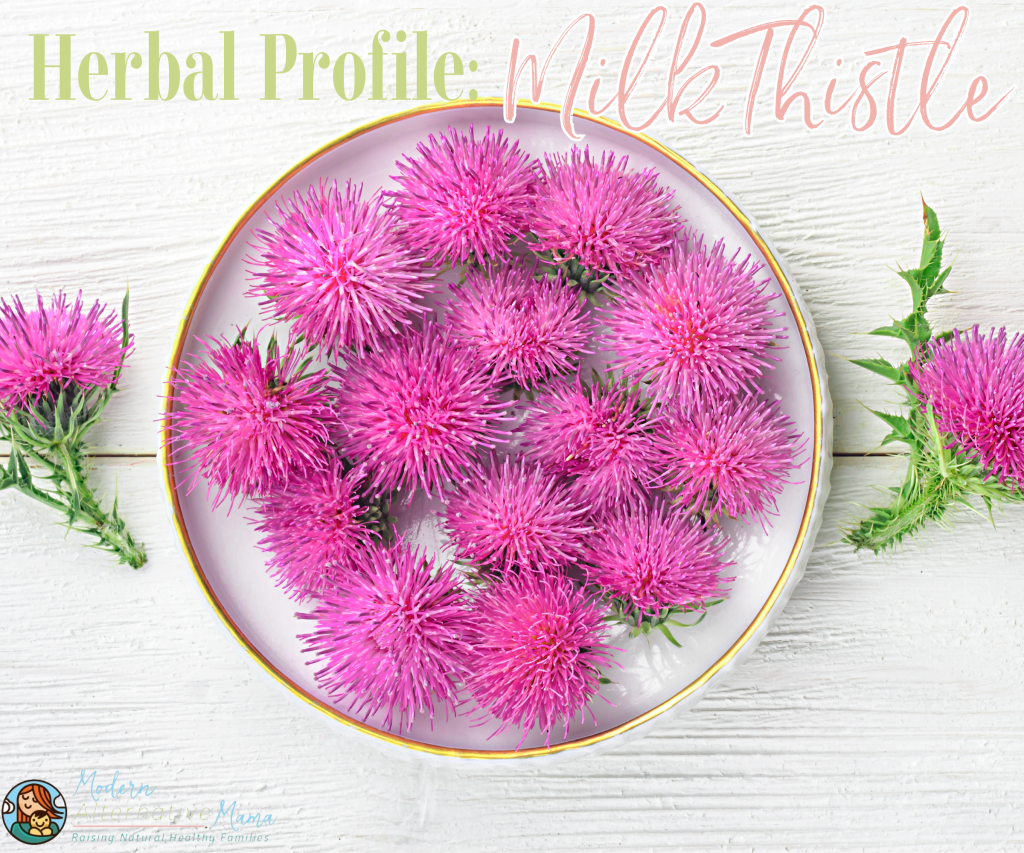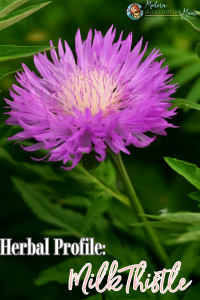What is Milk Thistle?
Milk thistle, sometimes called St Mary’s Thistle or its scientific name Silybum marianum L., is a part of the Asteraceae or Compositae (sunflower) family. Milk thistle can be identified by its distinctive thistle and shiny green leaves with white marbling. Milk thistle has bright magenta/purple flowerheads with thick, spine-tipped clusters around the base of the flower head. The leaves, stems, and flowers have stiff, sharp spines (1).
Health Benefits of Milk Thistle
For thousands of years, milk thistle has been used for its various health benefits, such as:
Antioxidant Properties
Antioxidants can help fight damage from harmful free radicals. The buildup of free radicals has been linked to chronic diseases, such as cancer and heart disease (2). Silymarin is an extract of milk thistle containing various flavonolignans that can improve antioxidant defense mechanisms, classifying them as natural antioxidants (3). Studies show milk thistle seeds have exemplary 1–diphenyl–2–picrylhydrazyl (DPPH) and ferric-reducing power responsible for its free radical scavenging activity and prevention of lipid peroxidation (4).
Antiviral Properties
Some studies indicate that milk thistle has antiviral properties. An antiviral property is when a substance, or in this case, an herb, can kill a virus or suppress the virus’ ability to replicate, multiply or reproduce (5). Although some sources claim milk thistle has no antiviral properties (6), milk thistle has been documented to have antiviral properties against flaviviruses, togaviruses, influenza viruses, human immunodeficiency viruses, and hepatitis viruses (7).
Anti-Inflammatory Properties
Thanks to its antioxidant compounds, milk thistle can reduce inflammation, especially from free radical damage. Chronic inflammation has been linked with many diseases, such as type 2 diabetes, asthma, and certain cancers (8). Animal studies demonstrate silymarin’s ability to protect against inflammation in the airways of mice with allergic asthma (9). Another animal study found silymarin helps control asthmatic symptoms by regulating immune responses (10).
May Support the Immune System
The immune system protects the body from outside invaders, such as bacteria, viruses, fungi, and other toxins (11). When you support your immune system, you can support your body’s ability to fight off sickness. As previously stated, in animal studies, silymarin regulates immune responses. Another animal study found milk thistle improved immunity (12). In human studies, these positive immune responses were also found (13).
May Increase Breastmilk Production
Lactation occurs when hormonal changes signal the mammary glands to make milk in preparation for a baby (14). In animal studies, silymarin positively impacted feed and growth outcomes for some laboratory animals (15). In human studies, mothers who took 420 mg of silymarin for 63 days produced 64% more milk than those who didn’t (16).
May Improve Blood Sugar Levels
As of 2020, 34.2 million (1 in 10) Americans have diabetes, and another 88 million (1 in 3) Americans have prediabetes (17). On the bright side, studies have evaluated milk thistle’s compounds and discovered similar actions to some diabetic medications. Studies have found milk thistle improves insulin sensitivity, decreases blood sugar levels, and reduces the risk of diabetic complications like kidney disease (18). Additionally, studies demonstrate people taking silymarin experience significant reductions in fasting blood sugar and HbA1c levels (19).
May Support Heart Health
Unfortunately, heart disease is the world’s number 1 cause of death (20). Due to the incredibly complex determinants of heart disease and various possible contributions, it’s hard to pinpoint an exact way to prevent it. Still, you can at least take steps to lower your overall risk. For instance, “bad” LDL cholesterol can build up in your arteries and potentially cause damage (21). That’s where milk thistle may come into play.
Some research indicates milk thistle can positively impact cholesterol levels. In animal studies, rats fed a high-cholesterol diet who were given silybin had significantly lower total blood cholesterol and triglyceride levels (22). In human studies, people who took milk thistle for their diabetes also experienced lower cholesterol levels than the placebo group (23).
May Promote Liver Health
The liver is the largest internal organ, responsible for over 500 vital functions like bile production, detoxification, production and regulation of vital bodily processes, and more (24).
Milk thistle is well known for its ability to project the liver (25). Milk thistle contains a bioflavonoid called silymarin, which helps to support and detox the liver naturally (26). Milk thistle is often used in alternative health by people with liver damage from alcoholic liver disease, non-alcoholic fatty liver disease, hepatitis, liver cancer, and more (27,28,29). Studies have also shown milk thistle supplementation improved liver function in participants with liver disease, showing promise in reducing liver inflammation and damage (30).
May Promote Bone Health
Low bone mass affects an estimated 43 million older adults in the United States, leading to osteoporosis and an increased risk of bone fractures and breaks (31). Thankfully studies have found milk thistle can help prevent bone loss (32). In animal studies, milk thistle effectively prevented estrogen deficiency-induced bone loss in postmenopausal mice with osteopenia (33). Animal studies have also found milk thistle stimulates bone mineralization in ovariectomized rats (34).
These bone health benefits have also been studied in humans and can prevent and delay bone loss in postmenopausal women (35,36).
May Promote Brain Health
Brain health refers to cognitive health, motor functions, emotional functions, and tactile functions. Brain functions may decrease across several areas as we age due to neurological conditions like Alzheimer’s, Parkinson’s, or even amyloid plaques (37). Thankfully, milk thistle’s compounds can pass through the blood-brain barrier, creating a neuroprotective effect (38).
Studies note possible neuroprotective properties in milk thistle, which may help prevent brain function decline due to aging (39,40). In test-tube studies, thanks to it’s antioxidant properties; silymarin prevented oxidative damage to brain cells (41). These same benefits were reported in animal studies, leading scientists to believe milk thistle can help prevent mental decline (42).
Traditionally, milk thistle has been used for thousands of years to manage neurological conditions like Alzheimer’s and Parkinson’s (43). In people with Alzheimer’s, amyloid plaques build up in high numbers in the brain (44). Several animal studies have seen reduced numbers of amyloid plaques in animals with Alzheimer’s, making milk thistle beneficial to brain-declining neurological conditions (45,46,47)
Anticancer Properties
Statistics say that 158.3 of every 100,000 individuals will die from cancer, but what if they didn’t have to (48)? Studies suggest the antioxidant properties of silymarin may also have anticancer properties (49). Several studies have demonstrated milk thistle’s ability to inhibit the growth of cancer cell lines, exert direct cytotoxic activity toward cancer cell lines, and possibly increase the efficacy of chemotherapy agents (50).
Several studies have demonstrated that milk thistle successfully destroys various cancer cells (51,52,53,54). In animal studies, milk thistle reduced the side effects of standard cancer treatments like chemo and radiation therapy (55,56). Aside from reducing the side effects of standard cancer treatments, milk thistle has also been documented to increase the efficacy of these treatments (30).
Safety Concerns
According to mainstream sources, despite acknowledging that milk thistle has been traditionally used in pregnant and breastfeeding women, they claim its safety is unknown. They recommend checking with your doctor before using milk thistle if you’re pregnant or breastfeeding. They also recommend against milk thistle for children, but as usual, they provide zero sources to their claims despite safely being used for centuries with no adverse events reported (57).
Contrarily, trusted herbalist Richard Whelan, since milk thistle is a member of the Compositae family, there is a small chance of allergy. Allergy risk aside, milk thistle is exceptionally safe to take while pregnant or breastfeeding and can benefit people of all ages and stages of life (58).
Regarding allergic reaction risks, those allergic to other species of the Compositae family, like artichokes, kiwi, ragweed, daisies, marigolds, and chrysanthemums, are at higher risk of an allergic reaction to milk thistle.
How to Use Milk Thistle
You can find milk thistle in dried bulk, pills, powders, extracts, or tinctures. Tinctures always contain the most concentrated amount of herbs. Teas and soups are also options, especially when following Ayurvedic medicine recipes. Some great articles to check out featuring the use of milk thistle include:
- Liver Support for PMS
- 7 Ways to Naturally Balance Your Hormones
- How to Naturally Boost Your Milk Supply (+ Mother’s Milk Tea Recipe)
Follow the recommendations of any supplement; some of my recommendations include:
- Earthley’s Candida Cleanse helps to fight yeast and candida overgrowth to restore gut health. Made with 100% natural ingredients, this herbal tincture is safe and effective in bringing the relief you’ve been looking for.
- Earthley’s Liver Love promotes liver health by supporting detox and proper function. The liver is a critical, hard-working organ, and this herbal tincture provides 100% natural support.
- Earthley’s Mama’s Magic Milk Boost is an herbal tincture created to help increase milk supply with all-natural ingredients. This product is high in vitamins and minerals to nourish the body, but it also contains herbs to soothe baby’s tummy. This tincture is made with the highest-quality ingredients and supports both mom and baby on their breastfeeding journey.
- Earthley’s Thyroid Support is an herbal formula for thyroid support and total body wellness. The herbs include ashwagandha, amla berry, licorice root, Brahmi leaf, and milk thistle seed. It also supports a healthy liver and stress response and is rich in vitamin C.
Disclaimer: This post is not intended as medical advice. These statements have not been evaluated by the FDA, and nothing in this post is intended to diagnose, treat, or cure anything. If you have questions, please do your own research or seek advice from a health professional.








Your picture is of a bull thistle not of a milk thistle.
I have milk thistle growing in my front yard! Thought it was a terrible weed at first, then realized it was going to flower, so I let it be. Now it has beautiful purple flowers AND a ton of health benefits!!
Happy I left it alone to grow!!
How milligrams in a teaspoon? I take 1 teaspoon every three days. Ia that ok?